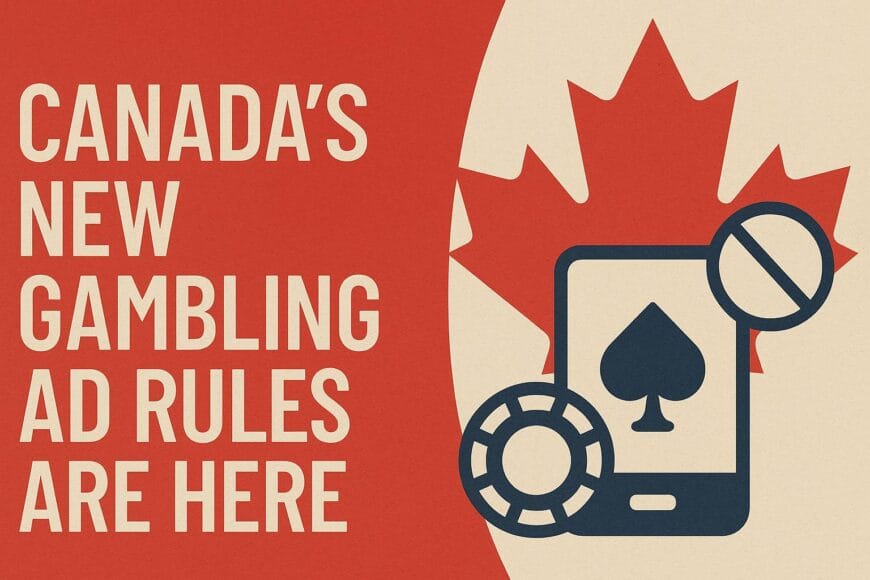Canada’s new gambling ad rules are here: what changes now

Canada’s gambling ad landscape is changing rapidly, and if you’ve noticed fewer celebrity endorsements for betting apps along with a surge in “play responsibly” messages, you’re not imagining it. Stricter rules in Ontario—and potential nationwide standards—are reshaping how operators can market to Canadians. These changes aim to reduce youth appeal, control bonus advertising, and place a stronger emphasis on safer play. In this article, we’ll break down the new regulations, explore what they mean for players, media, and operators, and look ahead to what’s next for the industry in Canada’s evolving and increasingly regulated iGaming environment.
What already changed in Ontario (and why it matters nationally)
Ontario—home to the country’s largest regulated iGaming market—set the tone with tough advertising standards that kicked in on February 28, 2024:
No athletes in betting ads. Current or retired athletes can’t appear in iGaming advertising or marketing in Ontario. The goal is reducing youth appeal. Celebrities likely to appeal to minors are also off-limits.
Inducements can’t be advertised publicly. You won’t see splashy “bonus” or “free bet” offers on TV, billboards, or social—only on an operator’s own site or via direct marketing with active player consent.
Why that matters beyond Ontario: other provinces, regulators, and lawmakers often treat Ontario as the proving ground. Alberta, preparing a more open market, is looking to mirror much of Ontario’s framework—including its ad restrictions.
A national framework is on the table
The conversation about gambling advertising in Canada is no longer just provincial—it’s moving to the federal stage. In May 2025, a bill was introduced proposing a national framework for sports-betting advertising. This framework wouldn’t ban gambling ads entirely but would impose much tighter controls. Measures under consideration include restricting ad placement to certain hours (often called “watershed” periods), setting limits on the number of ads shown during live events, and creating a formal review process for advertising standards overseen by a central authority. The intention is to reduce exposure among vulnerable groups, curb aggressive marketing tactics, and ensure responsible gambling messaging remains a visible and integral part of every campaign, no matter the platform or province.
Complaints are shaping enforcement
Over the past three years, Canada’s advertising standards body has received a steady flow of complaints about gambling promotions, covering everything from misleading bonus claims to marketing that might appeal to minors. This data is now being used to refine enforcement priorities and industry expectations. In practice, this means operators, broadcasters, and affiliates are becoming more cautious with both the tone and frequency of their campaigns. Messages must be transparent, terms must be clear, and responsible gambling notices must be prominently displayed. The growing feedback loop between public complaints and regulatory updates is encouraging a shift toward more conservative, compliance-focused marketing. This trend is likely to accelerate as both provincial and national frameworks become more closely aligned.
Province-by-province notes you should know
- Ontario: Athlete/celebrity restrictions; public bonus ads prohibited; responsible-gambling prominence; placement rules that avoid youth audiences. Ontario remains the benchmark for compliance.
- Quebec: Contest law burdens were lifted in 2023, but French-language requirements still apply when marketing to Quebec residents. If a promo touches Quebec, ensure French rules are respected.
- Alberta: Planning an open market modeled on Ontario—so operators and media partners should plan for similar ad boundaries.
What you’ll notice as a player
For Canadian players, the most obvious changes will be in the look and feel of gambling ads. Expect to see fewer famous faces—especially athletes and celebrities known among younger audiences—and a noticeable reduction in flashy, bonus-heavy messaging in public spaces. Promotions will still exist, but they’ll be moved behind logins or sent directly to players who have opted in. You’ll also see more responsible gambling prompts, such as age gates, helpline numbers, and reminders to set betting limits. These adjustments are intended to create a safer environment without stripping away player choice, ensuring that those who engage with online betting do so in a regulated, transparent, and well-informed manner.
What operators and affiliates must get right (now)
- Creative casting: No athletes or youth-appeal celebrities in Ontario—review existing campaigns and talent contracts across Canada to avoid spillover issues.
- Offer messaging: Keep inducements behind the login or on owned channels, with explicit, active player consent for direct marketing. Public teasers that convey a bonus remain risky.
- Targeting & placement: Avoid youth-skewing channels, programming, and venues. If content could appeal to minors, don’t place betting ads there.
- Prepare for federal harmonization: Track national legislative developments; plan for potential watershed hours, event-adjacent ad limits, and centralized oversight. Build flexible media plans that can throttle volume quickly.
For teams, leagues, and broadcasters
Partnerships built around athlete-led creative will need significant re-tooling under the new advertising rules. This shift affects everything from promotional campaigns to sponsorship activations at live events. Broadcasters, in particular, should prepare for stricter controls on how often and when gambling ads can be aired, especially during live sports coverage. If a national code is implemented, expect tighter frequency caps, restrictions on placement within broadcasts, and greater scrutiny on audience targeting. These measures could reduce the sheer volume of gambling ads seen during major sporting events. Many industry analysts believe we will see this decline in ad saturation even before national legislation takes effect, as operators and media partners adjust proactively to avoid compliance issues and public backlash.
For Canadian Bettors Who Care About Safer Play
The shift in advertising rules is rooted in harm-reduction strategies designed to protect players, particularly young and vulnerable audiences. By banning celebrity endorsements that appeal to minors and removing aggressive bonus promotions from public spaces, regulators aim to create a more controlled and responsible betting environment. These changes do not eliminate bonuses or promotional offers but move them into licensed environments where players have given explicit consent to receive them. For bettors, this means advertising will focus more on safe play tools—such as deposit limits, time trackers, and clear access to help resources—ensuring that online betting remains an enjoyable and sustainable activity within a secure, regulated framework.
Conclusion
Ontario’s rules have already reshaped the iGaming marketing landscape by banning youth-appeal celebrity endorsements, removing public bonus advertising, and enhancing responsible gambling visibility. Now, the conversation is moving toward national standards that would align regulations across provinces, potentially introducing limits on ad timing and frequency. For players, the shift promises a more transparent, consistent, and safety-focused environment. For operators, affiliates, and broadcasters, it signals the need for compliance-first strategies and adaptable campaigns. The advertising may change, but the essentials for a trustworthy, regulated betting experience remain the same. For deeper insights, tune in to our podcast episode Canada’s New Gambling Ad Rules: The End of Flashy Casino Marketing?, where we explore the future of gambling ads in Canada.
FAQ
In Ontario, you can’t publicly advertise inducements, bonuses, or credits. Operators can show them on their own sites and via direct marketing with the player’s active consent. Other provinces vary, but many partners are aligning with Ontario to stay future-proof.
No. The prohibition covers athletes, whether active or retired, plus celebrities with youth appeal.
Unlikely. The proposed bill points to national standards and tighter limits, not an outright ban. Details will be refined in Parliament if it passes.
Most Recent News
Get the latest information







